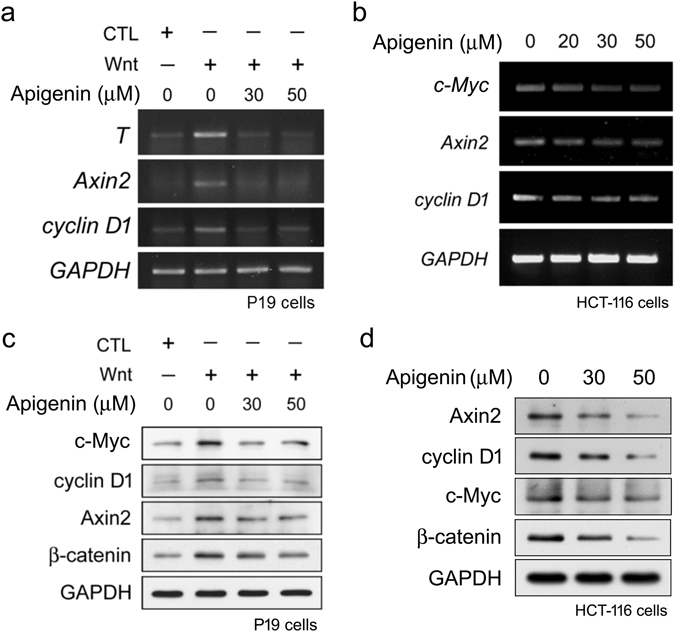Figure 2.

Apigenin suppresses the expression of Wnt target genes. (a) Apigenin inhibits the mRNA expression of Wnt target genes in Wnt-stimulated P19 cells. Cells were treated with control-conditioned medium, Wnt-3a-conditioned medium, or different concentrations (30, 50 μM) of apigenin in Wnt-3a-conditioned medium for 16 h, and then cells were collected for RT-PCR analyses using gene-specific primers for T, Axin2, cyclin D1, and GAPDH (used as the internal control) as described in methods. (b) Apigenin represses the mRNA expression of Wnt target genes in HCT-116 cells. Cells were treated with different concentrations (0, 20, 30, 50 μM) of apigenin for 22 h and total RNAs were isolated. cDNAs were then synthesized and used for amplification of the specified genes using gene-specific primers for c-Myc, Axin2, cyclin D1, and GAPDH. (c) Apigenin inhibits the protein expression of Wnt target genes in Wnt-stimulated P19 cells. Cells were treated with control-conditioned medium, Wnt-3a-conditioned medium, or different concentrations (30, 50 μM) of apigenin in Wnt-3a-conditioned medium for 16 h, and then cells were collected for Western blotting analyses with anti-c-Myc, anti-cyclin D1, anti-Axin2, anti-beta-catenin, and anti-GAPDH (as the loading control). (d) Apigenin inhibits the protein expression of Wnt target genes in HCT-116 colorectal cancer cells. Cells were treated with different concentrations (0, 30, 50 μM) of apigenin for 22 h and total cell lysates were isolated for Western blotting analyses with anti-Axin2, anti-cyclin D1, anti-c-Myc, anti-β-catenin, and anti-GAPDH.
